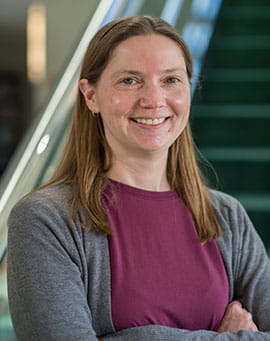Research descriptions
Background
Rheumatoid arthritis (RA) is an autoimmune disease that affects approximately 1.3 million individuals in the United States. Of those, about 75 percent are women.
RA is a chronic (i.e., long-term) disease that causes pain, stiffness, swelling, and limited motion and function of many joints. While the cause of RA is unknown, new research is helping to shed light on what makes the immune system attack the body and create the joint inflammation that plagues patients with RA. We know that immune cells (T and B cells) play critical roles in the disease’s progression.
RA eventually leads to debilitating destruction of cartilage and bone, and unfortunately there is no cure. Treatments to manage symptoms have improved greatly over the years. However, they are ineffective at controlling disease progression, as they rely on the reduction of inflammation by focusing only on the end stage of the disease.
Focus on RA triggers
Dr. Laura Mandik-Nayak is taking a different approach by targeting the early stage of RA. Her lab focuses on the triggering mechanisms by which the immune system becomes activated to induce inflammation in the joints.
Recently, Dr. Mandik-Nayak identified a pathway that triggers the activation of autoreactive T and B cells during the development of arthritis. This pathway involves an enzyme implicated in immune regulation, IDO (indoleamine 2,3-dioxygenase). IDO activity is elevated in arthritis patients. Dr. Mandik-Nayak’s recent data demonstrate that inhibiting IDO activity interferes with immune cell activation and arthritis development, suggesting that the IDO pathway is an important mediator of the disease process.
Her group examined both IDO1 and IDO2 in relation to autoimmune arthritis development. Their work reveals that IDO2, but not IDO1, is an important component of developing arthritis symptoms. They found that IDO2 drives the autoreactive T and B cell response leading to arthritis. The enzyme appears to specifically affect the production of autoantibodies, but does not seem to play a role in mediating antibody responses in general.
Dr. Mandik-Nayak is investigating if using an IDO inhibitor could lead to a therapeutic agent for RA. Her work may lead to a new approach and to novel medicines for the prevention and treatment of RA and possibly other autoimmune diseases.
About her lab
Since starting the first immunological laboratory at LIMR in 2006, Dr. Mandik-Nayak has focused on mediators that drive the inflammatory autoimmune response in mouse models of RA, systemic lupus erythematosus, and rheumatoid heart disease, with an emphasis not only on the immunoregulatory enzymes of IDO, but also the small GTPase RhoB.
Lab personnel
- Lauren Merlo, PhD, Research Assistant Professor
- Weidan Peng, PhD, Research Assistant Professor
- James Montgomery, BA, Biomedical Research Assistant

